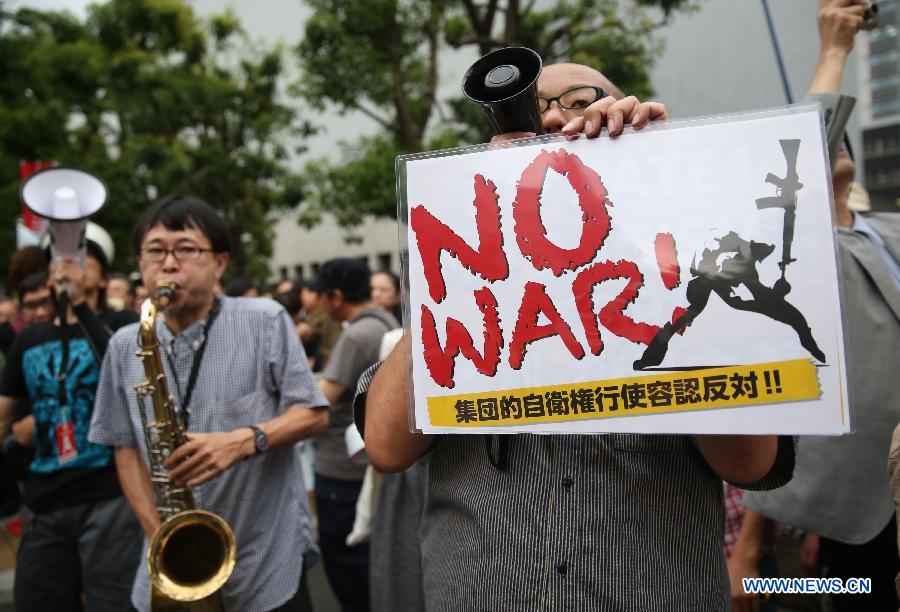
TOKYO, June 30 -- About ten thousand protestors rallied in front of the Japanese Prime Minister Shinzo Abe's official residence at dusk on Monday and shouted loud by using megaphones and drummed, making them to be heard even at the Kasumigaseki, about 1 kilometer away from their gathering site.
The protest, one of so many in recent days, took place only one day before the Japanese government seeking a green light to allow the Japanese Self-Defense Forces to exercise the rights to collective self-defense through reinterpreting the country's war- renouncing pacifist Constitution.
The rally was held was only one day after a mid-aged man who opposes the Japanese government's attempt to exercise the rights to collective self-defense immolated himself on a girder of a pedestrian bridge at crowded Shinjuku railway station in downtown Tokyo, trying to make the government be aware of his opinion.
Tragically, the shocking action of the single man whose name and career still remains unknown seemingly did not touch politicians in Nagatacho, center of Japanese politics, with Japanese mainstream media's collectively indifference towards the incident. However, the rally was the one much directed to the prime minister who initiated Japan's more right-leaning politics.
The scenario was seen near the country's parliament when the Abe's administration shoved through the Special Secrecy Law in October last year, despite fierce criticism at home.
This time, protestors shouted"do not destroy the pacifist Constitution"and"Step down, Abe," holding banners that read"Tokyo against Fascism,""Article 9 rules. Speak up. Now or Never.Be true to the Article 9"and"absolutely oppose cabinet resolution."
Japan's current Constitution, famous for its war-renouncing Article 9, bans the Self-Defense Forces (SDF) engaging fighting outside Japan, but the collective defense right will drag Japan into war overseas. "I totally oppose lifting the ban on exercising collective self- defense rights because I will never send my children to a battlefield to kill or be killed in a war," a protestor told Xinhua, identified herself as Murayama.
Another opponent whose family name is Ishikawa said it is unforgivable that Abe's administration is pushing Japan to the edge of war by destroying the pacifist Constitution and approving the Special Secrecy Law.
"If we don't against it, there will be no future for Japan and no future for our children,"shikawa said.
Besides, the controversial issue related not only to Japanese people, but also has much to do with foreigners who live in Japan. "I don't want to see the country go to war and you can see many other people have the same opinion. So I think that's the way how they try to put this through and apparently many people are against this as it is not democracy,"a German girl in her 20s told Xinhua in anonymity.
According to latest poll conducted by Japan's Nikkei News from June 27 to 29, half of Japanese oppose the country to exercising the collective self-defense and 54 percent of respondents said no to reinterpretation of Japan's anti-war constitution, compared with 29 percent who support the move.
An earlier poll by Japan's Mainichi Shimbun showed that 58 percent of respondents are against the way Abe uses to give green light to the collective defense, while 38 percent voted for his efforts.
It also found that among the opposition, about 83 percent said the collective defense rights will drag Japan into war, and the support rate for Abe's Cabinet fell to 45 percent, the lowest since Abe took office in December 2012.
As the opponents will continue their protests on Tuesday, will Abe pay a little attention to the will of the public? Despite his saying that he upholds the value of rule of law and democracy, his move will finally expose his real nature.
By Liu Tian, Liu Xiuling